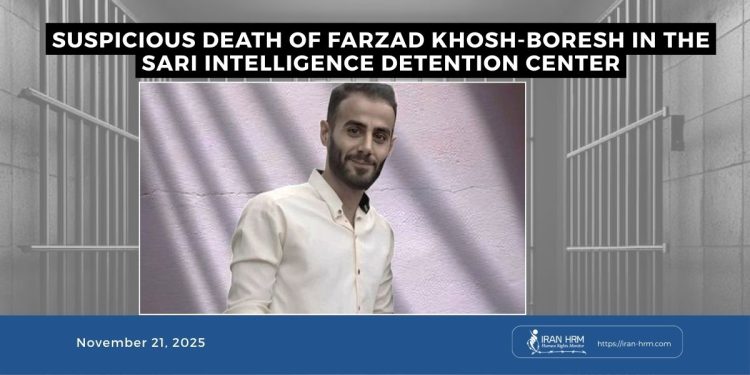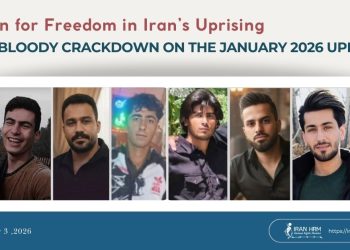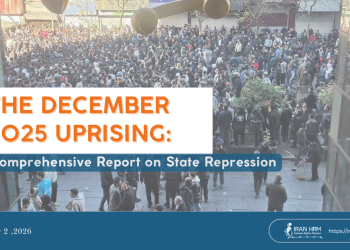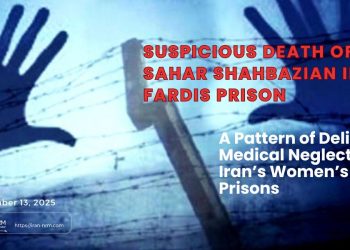Farzad Khosh-Boresh, a 31-year-old resident of Neka, died under suspicious circumstances only six days after his renewed arrest in the detention center of the Intelligence Office in Sari. Multiple bruises and bodily injuries observed on his body before being transferred to the forensic department reinforce the likelihood of torture and coercion for forced confessions, increasing serious concerns about violations of the right to life and violent treatment in security detention facilities.
Case Background
Farzad Khosh-Boresh had previously been arrested in Mordad 1404 (July–August 2025) on charges related to “posting critical and protest content,” and was released on bail after some time. Security pressures continued, and on 21 Aban 1404 (12 November 2025), he was arrested again by the Intelligence Office. During this second arrest, his family was kept completely uninformed about his condition.
On 27 Aban 1404 (18 November 2025), the family was suddenly informed of his death. The initial explanation given to them claimed that he had “felt unwell and died after being transferred to a hospital,” but no clarification was provided regarding his medical condition, the process of transfer, or the cause of death. Due to the lack of details and contradictions with the physical appearance of the body, this account was immediately met with serious doubt.
Incident Description and Signs of Beating
Witnesses who saw Khosh-Boresh’s body before its transfer to the forensic department reported extensive bruising, contusions, and multiple marks of impact on his body. According to these individuals, the severity of the physical injuries was entirely visible and undeniable and could not be reconciled with any notion of “natural death” or “sudden physical deterioration.”
A knowledgeable individual who viewed the body stated:
“The signs of beating were obvious. There was nothing that resembled a natural death, and they did not allow us to inspect further.”
The presence of such injuries during detention, especially inside a facility under full control of a security agency raises a serious likelihood of torture and coercion for forced confessions. This pattern has been repeatedly reported in similar cases in recent years.
Concealment, Security Pressure, and Concerns About Destroying Evidence of Torture
After his death, the body was quickly transferred to the forensic department, and no official report regarding the cause of death has been released so far. The behavior of the security agency, including preventing information from being shared, blocking any detailed examination of the body, and direct threats against the family; has raised concerns about possible alteration or manipulation of the forensic report.
Security forces were also present at the burial ceremony and filmed the attendees. Along with continuous warnings about sharing information, these actions placed the family under heavy pressure and effectively prevented them from speaking publicly. The family has so far refrained from any interviews or public statements due to these threats.
Human Impact and Social Consequences
Khosh-Boresh’s death in custody is part of a recurring pattern of suspicious deaths inside security detention centers—cases lacking independent oversight, judicial transparency, and family access to the truth. Threating families into silence, filming burial ceremonies, and the complete absence of accountability from responsible agencies have created a deep atmosphere of fear and distrust.
Depriving detainees, especially political and ideological prisoners; of access to medical care and exerting pressure for forced confessions is part of a long-documented pattern repeatedly reported by families and human rights advocates. The death of Farzad Khosh-Boresh, in this context, represents yet another instance of violations of the right to life, the prohibition of torture, and arbitrary detention.
Current Situation and Call for International Follow-Up
The cause of Farzad Khosh-Boresh’s death has not yet been formally announced, and his family remains under security pressure, preventing them from sharing information. The rapid transfer of the body to the forensic department, the absence of any released report, and the denial of access to information have deepened ambiguities and highlighted the need for an independent investigation.
Given the clear signs of bodily injuries, the opaque arrest process, and the absence of any judicial oversight, the human rights community calls for the urgent attention of the UN Special Rapporteur about human rights in Iran, the UN Special Rapporteur on torture, and the Working Group on Arbitrary Detention to formally investigate this death in custody. Such action is essential to prevent similar cases and to ensure truth-finding.







